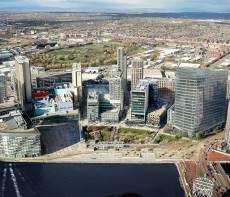July 11, 2016
London planning to hide Walkie Talkie with…more tall buildings? 0
 It was Frank Lloyd Wright who said ‘a doctor can bury his mistakes but an architect can only advise his clients to plant vines’. His words will be ringing in the ears of London planners who have decided they need to do something about the blight of Rafael Viñoly’s reviled Walkie Talkie building at 20 Fenchurch Street, according to an article in the Architect’s Journal. The building was last year’s Carbuncle Cup winner and has been held responsible for creating wind tunnels in the streets at its base and even frying people, shops and cars around it with reflected solar rays. Remarkably, the solution offered by planners appears to be to surround it with other tall buildings to hide it (while also creating new office space). Gwyn Richards, head of design for London, told the AJ: ‘One issue that has been brought to our attention is whether it would be preferable to have the Walkie Talkie effectively moved into the cluster so that it is less assertive. We are hearing from stakeholders saying that it would benefit the cluster to bring it into a tightly knitted group.’
It was Frank Lloyd Wright who said ‘a doctor can bury his mistakes but an architect can only advise his clients to plant vines’. His words will be ringing in the ears of London planners who have decided they need to do something about the blight of Rafael Viñoly’s reviled Walkie Talkie building at 20 Fenchurch Street, according to an article in the Architect’s Journal. The building was last year’s Carbuncle Cup winner and has been held responsible for creating wind tunnels in the streets at its base and even frying people, shops and cars around it with reflected solar rays. Remarkably, the solution offered by planners appears to be to surround it with other tall buildings to hide it (while also creating new office space). Gwyn Richards, head of design for London, told the AJ: ‘One issue that has been brought to our attention is whether it would be preferable to have the Walkie Talkie effectively moved into the cluster so that it is less assertive. We are hearing from stakeholders saying that it would benefit the cluster to bring it into a tightly knitted group.’
































July 5, 2016
LBGT inclusion in the workplace relies on FM and HR best practice 0
by Peter Holmes • Comment, Facilities management, Wellbeing, Workplace, Workplace design
(more…)